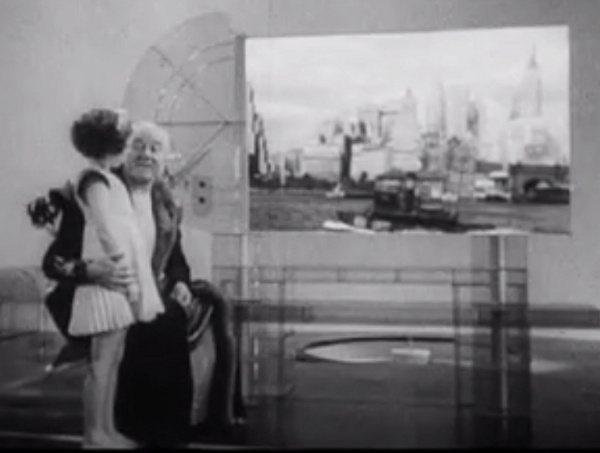Saving the World with Engineering
December 7, 2010
In a
previous article (Indistinguishable from Magic, June 12, 2008) I mentioned the
The Shape of Things to Come, a prognostic SF novel written in 1933 by
H.G. Wells.[1] This novel was made into the 1936 film,
Things to Come (William Cameron Menzies, Director) in which
scientists and
engineers save the world from endless war.[2] Even after that, they're still vilified by
Luddites in the new world they've created. Many of the special effects in this film glorify engineering.
G. Pascal Zachary has just written an opinion piece entitled, "Why Engineers Must Try to Save the World," in the December, 2010, issue of the
IEEE Spectrum.[3] His article is subtitled, "Scientists also should heed the messianic impulse."

HD television in the 1936 film, "Things to Come."[2]
I mentioned G. Pascal Zachary in a
previous article (Basic Research, October 22, 2010), when I referenced his 1997 book, "Endless Frontier: Vannevar Bush, Engineer of the American Century."[4,5] This is a thorough and scholarly biography of one of America's most important engineers,
Vannevar Bush. Bush is best known as the author of "
Science, The Endless Frontier,"[6] the 1945 report that helped to create the
National Science Foundation.
The point of Zachary's article is that while the idea of science saving the world from things such as
global warming and
energy scarcity is good, there are plenty of things we can do with engineering right now. Zachary echoes the argument made by
Henry Petroski in his latest book,"The Essential Engineer,"[7] that we shouldn't just pour our money into research, but try to adapt more of the research we've done into useful projects. I'm reminded of a cartoon I saw many years ago (I think it was in a magazine called
R&D) in which a lab-coated scientist is standing in front of the CEO's desk, and the CEO is shouting, "Enough research! I want some development!" Zachary quotes the following from the abstract of an article by Daniel Sarewitz and Roger Pielke that appeared in the 2000 Atlantic Monthly:
"If we took practical steps to reduce our vulnerability to today's weather, we would go a long way toward solving the problem of tomorrow's climate."[8]
I mentioned the Luddites in Well's screenplay earlier in this article, and we face our own Luddites today. Zachary observes that those on the
Religious Right resent and resist any scientific effort to remedy existential flaws, since such things should be left to God. Not that the
Left is much more of a friend, since it tends to fixate on the
unintended consequences of science. The Left does have a point, since the same
atomic bomb that brought a quick end to
World War II also enabled the
Cold War and numerous world tensions thereafter.
Osama bin Laden is as much a product of oil production as the plastic of the keyboard on which this is being typed. The usual image of scientist in the cinema is the megalomaniacal villain who seeks world domination; or, at the very least,
one million dollars. There are also the unfortunate scientists on made-for-TV-movies who accidentally unleash some super-virus, giant reptile, swarming nanobots or
AI weapon system.
Since no one wants to willingly cut back on their lifestyle, there's always the possibility that we can attempt to protect the planet from global warming by deploying systems to decrease
insolation or to
gobble excess
carbon dioxide. There have been attempts to technically modify the weather for as long as I can remember, the most common of which is
cloud-seeding to make rain. Cloud-seeding was used to prevent rainfall during the
2008 Olympic Games in
China.[9] These efforts have been minimal and on an extremely local scale. However, planetary-scale engineering projects, from putting
huge sunshades into orbit or dumping
genetically engineered organisms into the oceans, are extreme measures rife with unintended consequences and should be avoided.
Specially designed homes that stay cool in the summer and warm in the winter with minimal energy demand are already possible. If you're interested in saving the planet, your own home is a good place to start.
References:
- H.G. Wells, "The Shape of Things to Come," (University of Adelaide E-Text).
- Things to Come (Free Internet video from Archive.org); listing in the Internet Movie Database.
- G. Pascal Zachary, "Why Engineers Must Try to Save the World," IEEE Spectrum, December 2010.
- G. Pascal Zachary, "The Endless Frontier: Vannevar Bush, Engineer of the American Century," (Free Press, January 1997).
- G. Pascal Zachary, Biographical Notes.
- Science, The Endless Frontier, A Report to the President by Vannevar Bush, Director of the Office of Scientific Research and Development, July 1945, (United States Government Printing Office, Washington: 1945).
- Henry Petroski, "The Essential Engineer: Why Science Alone Will Not Solve Our Global Problems," (Knopf, February 23, 2010; via Amazon), 288 pages.
- Daniel Sarewit and Roger Pielke Jr., "Breaking the Global-Warming Gridlock," Atlantic Magazine, July, 2000.
- Jacob Silverman and Robert Lamb, "Can China control the weather?," HowStuffWorks.com.
Permanent Link to this article
Linked Keywords: The Shape of Things to Come; H.G. Wells; Things to Come; scientists; engineers; Luddites; G. Pascal Zachary; IEEE Spectrum; Vannevar Bush; Science, The Endless Frontier; National Science Foundation; global warming; energy scarcity; Henry Petroski; R&D Magazine; Religious Right; Left; unintended consequences; atomic bomb; World War II; Cold War; Osama bin Laden; Dr. Evil; artificial intelligence; AI; insolation; carbon sequestration; carbon dioxide; cloud-seeding; 2008 Olympic Games; China; space sunshade; genetically engineered organisms; passive solar building design.